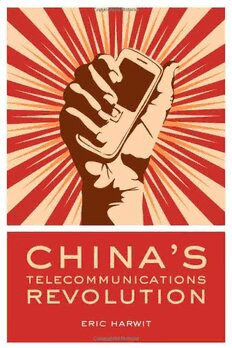Table Of ContentChina’s Telecommunications Revolution
This page intentionally left blank
China’s
Telecommunications
Revolution
Eric Harwit
1
3
GreatClarendonStreet,Oxfordox26dp
OxfordUniversityPressisadepartmentoftheUniversityofOxford.
ItfurtherstheUniversity’sobjectiveofexcellenceinresearch,scholarship,
andeducationbypublishingworldwidein
OxfordNewYork
Auckland CapeTown DaresSalaam HongKong Karachi
KualaLumpur Madrid Melbourne MexicoCity Nairobi
NewDelhi Shanghai Taipei Toronto
Withofficesin
Argentina Austria Brazil Chile CzechRepublic France Greece
Guatemala Hungary Italy Japan Poland Portugal Singapore
SouthKorea Switzerland Thailand Turkey Ukraine Vietnam
OxfordisaregisteredtrademarkofOxfordUniversityPress
intheUKandincertainothercountries
PublishedintheUnitedStates
byOxfordUniversityPressInc.,NewYork
(cid:1)EricHarwit2008
Themoralrightsoftheauthorhavebeenasserted
DatabaserightOxfordUniversityPress(maker)
Firstpublished2008
Allrightsreserved.Nopartofthispublicationmaybereproduced,
storedinaretrievalsystem,ortransmitted,inanyformorbyanymeans,
withoutthepriorpermissioninwritingofOxfordUniversityPress,
orasexpresslypermittedbylaw,orundertermsagreedwiththeappropriate
reprographicsrightsorganization.Enquiriesconcerningreproduction
outsidethescopeoftheaboveshouldbesenttotheRightsDepartment,
OxfordUniversityPress,attheaddressabove
Youmustnotcirculatethisbookinanyotherbindingorcover
andyoumustimposethesameconditiononanyacquirer
BritishLibraryCataloguinginPublicationData
Dataavailable
LibraryofCongressCataloginginPublicationData
Dataavailable
TypesetbySPIPublisherServices,Pondicherry,India
PrintedinGreatBritain
onacid-freepaperby
BiddlesLtd.,King’sLynn,Norfolk
ISBN978–0–19–923374–8
1 3 5 7 9 10 8 6 4 2
ToHirokoandMari
This page intentionally left blank
Preface
ThespeedofChina’sascenttoeconomicsuperpowerstatushasfewparal-
lelsinhistory.WhenIbegantowritethisbook,Iwaswonderinghowthis
astonishingdevelopment hadcomeabout. Theriseof thetelecommuni-
cations industry in the People’s Republic seemed to provide a mirror to
developments elsewhere in the country. Looking at this industry, I won-
dered how the particular mix of a centrally governed society venturing
into free market enterprise had managed to succeed in a field in which
foreignpowersappearedtohavefarmoreexperience.
DidChinasimplyfollowthehistoricdevelopmentspioneeredbyother
countries, ordid itchartits own destiny?What was therole that central
government took on? How did diverse government ministries and re-
gional officials imprint their own preferences on developments? In a
society as tightly controlled as China’s, how did the country’s vast rural
regionsfareinthetelecommunicationsrevolution,andhowdidthecen-
tral government keep tabs on political thoughts expressed across the
rapidlygrowingInternet?
Chinese enterprises seemed to have attracted foreign investments in
part to help the new home-grown ventures achieve rapid success. How
didthegovernmentassurethatChinawouldretainultimatecontrol,and
keepmostofthecreatedwealthathome?NowthatChinahasjoinedthe
World Trade Organization, some of the government’s past interventions
mayhavetobemodified.What,ifany,arethechangesonecanbeginto
discern?
These questions, and answers to them, have occupied my research for
thepastdecade.Ihavetriedinthisbooktoexpressmyfindingsasclearly
as possible, but China’s telecommunications revolution is still ongoing,
andmuchmaystillchangeintheyearsahead.Thebookshouldtherefore
beseenasaworkinprogress,reportingonthewaysChina’stelecommu-
nicationsindustryhasevolved,asaharbingerofallthatstillliesahead.
e.h.
Acknowledgments
Iextendthankstothemanyscholars,students,andbusinesspeopleinthe
telecommunicationsfieldwhoofferedtheirhelpandadviceovertheyears
ittookmetocompilethisbook.
MyconversationsandcollaborationswithDuncanClark,theChairman
of BDA (China), were integral and invaluable for framing many of the
book’sarguments.In2001,IpublishedanearlierversionofChapter4with
MrClark,andhavecontinuedtovaluehisfriendshipovertheyears.
I have also enjoyed talking with other telecommunications specialists.
CraigWatts,whohasheldanumberofimportantpositionsinthefieldin
China, was a source of inspiration for several of the book’s points, and
I appreciate his taking time to discuss and debate the issues of Chinese
governmentinvolvementinthetelecommunicationssector.KevinBunka
was also a ready source of ideas and knowledge on the evolution of the
field,andIvaluehisinputtomyunderstanding.J.P.Huang,asuccessful
businessmaninmanyareasandavaluedfriendinChina,helpedarrange
several key interviews during my years of fieldwork. Bu Wei also was
generous with her time and resources at the Chinese Academy of Social
Sciences. Many other Chinese business people and scholars with whom
I discussed key issues of telecommunications and the Internet chose to
remainanonymous.However,theywerealsointegraltothedevelopment
ofmywork.
Fellow American scholars of China’s political economy and scientific
development were also helpful in providing their opinions on various
parts of my work. Among these, Denis Simon and Richard P. Suttmeier
weremostencouraging.
Students both at the University of Hawaii and in China have been
extremelyhelpfulinfindingsupportingdataformywork.Amongthese,
Wang Qinghong in Hawaii consistently helped with key Chinese docu-
ments. In China, Peking University students Zhang Yue, Song Qian, and
Su Li conducted database and library assistance. Other students at the
University of Hawaii who provided research assistance included Allison
Acknowledgments
Pan,MichelleValle,ChrisGin,andAtsushiOuchi.Studentsinseveralof
mygraduate course seminars, in particular one that focused ontelecom-
municationsinEastAsia,werealsohelpfulasIpresentedmyideasinclass,
andlearnedfromtheirownresearchefforts.
Myresearchduringthepasttenyearswassupportedbyseveralsources
offunding.AmonggrantsIreceivedwereapostdoctoralfellowshipfrom
theUniversityofCalifornia;aFulbrightProgramresearchgrant;andfunds
from the University of Hawaii’s Center for International Business Educa-
tion and Research (CIBER) and National Resource Center for East Asia
(NRC-EA). During a 2000–1 sabbatical leave spent partially at Stanford
University, I appreciated the hosting of the Asia Pacific Research Center
(APARC). I spentseveral summers conducting research at Peking Univer-
sityusingtheUniversityofHawaii’sscholarexchangeprogram.
Finally,membersofmyfamilywerealsokeycontributorstothisproject.
My father, Martin Harwit, read each of my chapters and offered encour-
agementateverystep,asdidmymother,MarianneHarwit.Morepatient,
however,weremywifeHirokoanddaughterMari,whogenerouslyaccom-
modatedthemselvestomyyearsofworkonthisproject.Icouldnothave
finishedthisworkwithouttheirsupportandencouragement.
ix

